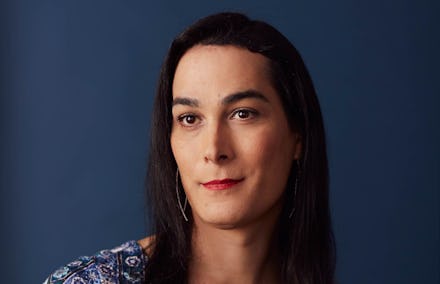Helena Price's 'Techies' Series Highlights the Untold Stories of the Tech Industry

Tech entrepreneurs and their employees work long hours and wear many hats. It's a grueling prospect — even for privileged white men, who dominate the tech industry. But for the scant women and minorities who work in the field of technology, the work exacts a different toll.
Isolation. That is the resounding complaint among the 100 men and women in Techies, a series of narrative interviews by photographer Helena Price documenting the untold stories of Silicon Valley. The subjects represent different genders, sexualities, ethnicities, socio-economic statuses and ages.
"Tensions are really high," Price told me over the phone. "Tech is not perceived so well from the outside."
Price, who spent years wrangling press, evangelizing and fostering creative campaigns for startups in Silicon Valley, used a Medium post to solicit entries for the project. She got 500 submissions. Tech elites like John Maeda, Om Malik and Evelyn Rusli lend the project big-name appeal.
Below are a few of the profiles Price featured.
John Maeda, Kleiner Perkins Caufield Byers
"When people say that diversity is important, I like to say instead, 'No, it isn't important. It's essential to increase the quality of discourse,'" venture capitalist Maeda told Price.
Maeda is the son of immigrant parents who made tofu for a living in Washington state. He's pushed for diversity in various spheres throughout his career; as president of the Rhode Island School of Design — where he says 70% of the students were female — he'd "always be like, 'So where are the men?" he told Price. When Maeda became a venture capitalist in Silicon Valley, he had the opposite experience: Everyone he was being introduced to was a young, white male.
Rather than accepting the overwhelming whiteness of the candidates being sent his way, he actively sought out meetings with a more diverse set of entrepreneurs.
"I began asking myself, 'If I'm having 10 people that I'm seeing, how can I now consciously edit my direction,'" he said.
Samantha Davison, Uber
"I actually learned about security from my dad through trying to thwart his efforts to keep me safe," says Samantha Davison, who works on cybersecurity awareness at Uber. She spent her after-school hours foiling her dad's efforts to keep her off Harry Potter web discussion boards — a mission that included setting up a computer in her family's basement on a segmented network so her dad wouldn't find out. The cat-and-mouse game taught Davison to become a hacker and security expert.
Lauren Frazier, Google
Attending an all-girls' school taught Frazier girls can do anything. "This whole concept of, 'Women can't do science' and 'girls are bad at math' just wasn't a thing," she told Price.
Frazier is now a lead iOS engineer at Google. Still, she feels shouldered with self-doubt — and something more. "I think that at work my struggle has really been this fear of failure, specifically being afraid that my failure is going to be an issue for not only myself but also for other black women in the future," she told Price.
With so few women of color in the field, Frazier feels like if she screws up something as routine as a meeting, it might make the company think twice about giving more responsibility to black women, she said.
Emily Eifler, virtual reality researcher
Eifler was doxed and pummeled with death threats on 4chan and Reddit after she asked a virtual reality panel how they "planned to prevent the clear race and gender biases of their conference and the industry as a whole from doing to VR what sexism and racism has done to video games." The threats didn't bother her, she said.
"I have the ability not to care because of my privilege," she told Price. "1. I'm white and cisgender and 2. I work for a place that can provide corporate security. Privilege means the death threats are less meaningful to me."
Eifler also experienced a traumatic brain injury when she was 10 years old. She's contracted "a grab bag of neurological issues" and repeated migraines that made it difficult to get an education, let alone ascend in a field that favors able-bodied people.
February Keeney, GitHub
February Keeney, a trans woman, was presenting "very genderqueer in interviews," she told Price — and not getting job offers.
"Finally, one day, I gave up," she said. "I went to an interview without nail polish, no lip gloss. I presented as male as possible. Lo and behold: I got an offer. The thing of it is every time I've been brought in for an on-site interview, where I was presenting male, I received an offer."
"It's pretty easy to sabotage somebody in the interview process if you want to," Keeney, now an engineering manager at GitHub, told Price. "And I'm sure anyone with a nonprivileged background faces these exact same type of things where all it takes is, 'I don't think they're a good fit,' or, 'Nah, they made me kind of uncomfortable' or, 'I really didn't like the way they answered this one thing.'"
Kent Brewster, Pinterest
With all the highly publicized millennial billionaires of Silicon Valley, it's hard to believe anyone older than 28 works in tech — but Pinterest "widgeteer" Brewster has been in the industry for 38 years. He likes working with youngsters, he told Price, because it keeps his perspective fresh.
Financially, he argues, innovation is easier than ever. "The cost of failing used to be $100,000," he told Price. "The cost of failing is now under a buck. You can fail for free. You can fail as much as you want. I think the lower the cost of failure goes, the easier it will be for people who have no business doing this — people like me — to actually give it a shot. I think that's the chief difference: This batch of tech can be made by anybody."
See Price's full project here.